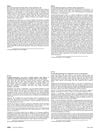 1 citations,
August 2023 in “Andrology”
1 citations,
August 2023 in “Andrology” Finasteride changes hormone levels and certain proteins in rats, but these effects can be reversed after stopping the drug.
12 citations,
April 2020 in “Medical hypotheses” Men on 5-alpha-reductase inhibitors might have worse COVID-19 outcomes.
 5 citations,
June 2018 in “Records of Natural Products”
5 citations,
June 2018 in “Records of Natural Products” Garden cress extract may help treat skin inflammation and androgen-related disorders.
 32 citations,
April 1999 in “Expert Opinion on Investigational Drugs”
32 citations,
April 1999 in “Expert Opinion on Investigational Drugs” Finasteride effectively treats male hair loss, improving growth and density.
 14 citations,
November 2006 in “Current Medicinal Chemistry”
14 citations,
November 2006 in “Current Medicinal Chemistry” New treatments for enlarged prostate are being developed to be more effective and have fewer side effects.
 7 citations,
July 2022 in “Pharmaceuticals”
7 citations,
July 2022 in “Pharmaceuticals” Pumpkin Seed Oil in niosomes may help treat hair loss and improve hair growth.
April 2024 in “Journal of clinical medicine” Effective treatment guidelines for frontal fibrosing alopecia are still unclear.
 6 citations,
May 2020 in “JAMA Ophthalmology”
6 citations,
May 2020 in “JAMA Ophthalmology” Using 5-alpha-reductase inhibitors, drugs for prostate issues and hair loss, may lead to eye abnormalities in men.
 13 citations,
June 2018 in “Current Urology Reports”
13 citations,
June 2018 in “Current Urology Reports” Hair loss drugs may cause sexual issues and infertility in men.
 November 2023 in “Expert Opinion on Pharmacotherapy”
November 2023 in “Expert Opinion on Pharmacotherapy” Finasteride and dutasteride are effective in treating male hair loss but can cause sexual side effects and birth defects.
 124 citations,
March 2012 in “JAMA”
124 citations,
March 2012 in “JAMA” Testosterone's muscle-building effects do not require its conversion to DHT.
 August 2024 in “Journal of Personalized Medicine”
August 2024 in “Journal of Personalized Medicine” Tamsulosin increases the risk of floppy iris during eye surgery.
 12 citations,
March 2017 in “Medicinal Chemistry Research”
12 citations,
March 2017 in “Medicinal Chemistry Research” Some curcumin-like compounds can effectively and safely block the enzyme linked to hair loss and other conditions related to male hormones.
 11 citations,
December 2018 in “Assay and Drug Development Technologies”
11 citations,
December 2018 in “Assay and Drug Development Technologies” Natural herbal compounds might treat certain medical conditions by reducing DHT levels, but more research is needed to confirm their effectiveness and safety.
 16 citations,
April 2017 in “Journal of Cosmetic Dermatology”
16 citations,
April 2017 in “Journal of Cosmetic Dermatology” Ficus carica leaf extract may help treat skin disorders by reducing inflammation and androgen effects in skin cells.
 6 citations,
March 2014 in “Herba Polonica”
6 citations,
March 2014 in “Herba Polonica” Plant extracts may help treat hormone-related hair loss.
 31 citations,
January 2017 in “Advances in Experimental Medicine and Biology”
31 citations,
January 2017 in “Advances in Experimental Medicine and Biology” Low testosterone and 5α-reductase inhibitors can harm men's metabolic and sexual health; testosterone therapy may help, but discussing 5α-RIs' side effects is important.
 January 2003 in “Humana Press eBooks”
January 2003 in “Humana Press eBooks” Dihydrotestosterone and 5α-Reductase play a role in hair loss and prostate health, and finasteride can increase hair growth in men without affecting sperm production, but it doesn't work for postmenopausal women with hair loss.
 2 citations,
November 2018 in “Indian Journal of Pharmaceutical Education”
2 citations,
November 2018 in “Indian Journal of Pharmaceutical Education” The developed model can predict effective 5-alpha-reductase enzyme inhibitors.
 March 2024 in “Cleveland Clinic journal of medicine”
March 2024 in “Cleveland Clinic journal of medicine” Alpha-blockers and 5-alpha reductase inhibitors are main treatments for BPH, with new support for phosphodiesterase-5 inhibitors and beta-3 agonists.
 3 citations,
August 1996 in “PubMed”
3 citations,
August 1996 in “PubMed” Finasteride reduces prostate size and serum levels, helping manage benign prostatic hyperplasia, without affecting prostate cancer detection. Regular monitoring is needed for users.
 34 citations,
July 2011 in “Journal of Dermatological Treatment”
34 citations,
July 2011 in “Journal of Dermatological Treatment” Curcuma aeruginosa extract combined with minoxidil effectively treats male-pattern baldness.
 22 citations,
December 2010 in “Journal of Cosmetic Dermatology”
22 citations,
December 2010 in “Journal of Cosmetic Dermatology” Finasteride may increase depression by reducing brain cell growth.
 4 citations,
June 2015 in “Journal of Genetics/Journal of genetics”
4 citations,
June 2015 in “Journal of Genetics/Journal of genetics” Genetic differences within ethnic groups may affect prostate cancer treatment effectiveness.
 March 2014 in “Journal of The American Academy of Dermatology”
March 2014 in “Journal of The American Academy of Dermatology” The new topical product combined with finasteride significantly increased hair thickness without side effects.
 15 citations,
April 2003 in “Journal of Dermatological Science”
15 citations,
April 2003 in “Journal of Dermatological Science” Gene differences may affect baldness treatment response in Korean men.
 3 citations,
April 2021 in “Journal of Medicinal Chemistry”
3 citations,
April 2021 in “Journal of Medicinal Chemistry” Finasteride may affect PNMT, causing side effects.
 January 2018 in “Surgical and Cosmetic Dermatology”
January 2018 in “Surgical and Cosmetic Dermatology” Finasteride and dutasteride are effective for male hair loss and enlarged prostate but may cause reversible sexual side effects.
 46 citations,
October 2012 in “Dermatologic Clinics”
46 citations,
October 2012 in “Dermatologic Clinics” Female pattern hair loss diagnosed by scalp appearance, treated with combined therapies and targeted approaches.
 3 citations,
November 2018 in “Journal of cellular physiology”
3 citations,
November 2018 in “Journal of cellular physiology” Serenoa repens and N-acetyl glucosamine/milk proteins complex may help with hair growth and prevent hair loss.




























